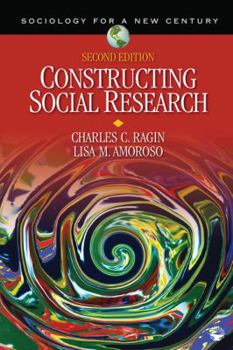Constructing Social Research: The Unity and Diversity of Method
Select Format
Select Condition 
Book Overview
Constructing Social Research answers the question: What is social science? Updated throughout with new references and examples, the Third Edition of this innovative text by Charles C. Ragin and Lisa... This description may be from another edition of this product.
Format:Paperback
Language:English
ISBN:1412960185
ISBN13:9781412960182
Release Date:July 2010
Publisher:Sage Publications, Inc
Length:248 Pages
Weight:0.80 lbs.
Dimensions:0.6" x 6.0" x 9.0"
Customer Reviews
2 ratings
Excellent introduction
Published by Thriftbooks.com User , 15 years ago
This is one of the best general introductions to methods in the social sciences, covering qualitative and quantitative approaches, and also introducing readers to Ragin's own qualitative comparative analysis, which is designed to rigorously analyze configurations of cases that are too small to be analyzed statistically but larger than the one or several depth cases of ethnography. I've used it for many years in classes on methods at the University of Wisconsin. It's too bad the "student" above who gave this a single star can't tell the difference between reviewing a book and reviewing its seller.
This is the first book any aspiring social scientist should read
Published by Thriftbooks.com User , 16 years ago
Over the past 15 years or so, sociology and political science have converged towards the methodological standards of positive economics. This trend has undeniably produced several positive effects. (For example, in Europe, it has forced social scientists to come down of their intellectualist/ideological pedestal and work through the difficult bits of research.) Nevertheless, it has also come at the expense of (a) rigorous interpretive work, and (b) careful theorizing. This (old-ish) book should be read carefully, for it can greatly help fix these probolems without jeopardising the benefits of positivism. When one reads other standard books on methodology (e.g. King et al.), one is left with two false impressions, namely that (1) qualitative research aims at more or less the same thing as quantitative research, and (2) "science" is about method. This book demonstrates the falsity of the first point. (For a demonstration of the falsity of the second point, one should turn to standard micro-economics books or maths-for-economics books, such as Nicholson & Snyder or Chiang, and ponder on the fact that it does not make sense to test hypotheses that are not derived from the same logically consistent assumptions.) Where others would make you think that all kinds of social scientific research are about finding regularities (and perhaps their causes), Ragin warns you of the complementarities between that kind of research and more "grounded" research that aims, for example, at interpreting significant events, or at discovering the objective function(s) that different kinds of actors seek to maximize. More, he makes it crystal-clear that, although qualitative research may sometimes come close to anthropology, it is not exempt from presenting and justifying its procedures. In other words, if the standard mainstream vision à la King et al. is not your cup of tea, do not think that you're exempt from methods: Ragin is here to remind you of the basic steps that you must take, and to drive you through the main works that you should read and work with. My only critique is that this book needs a new edition. Unless a new edition comes out, read this one, but bear in mind that some techniques have evolved over the past 15 years.




